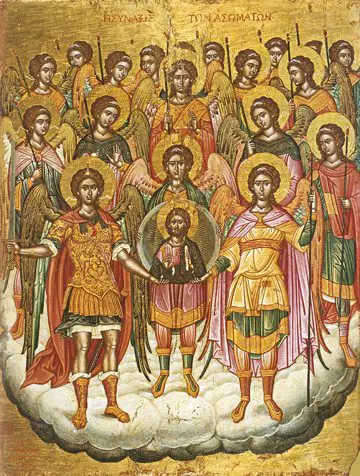“I believe in one God the Father, Almighty,
Creator of heaven and earth,
of all things visible and invisible”
(Symbol of Faith)
By the word invisible in the first article of the Creed we must understand the invisible or spiritual world to which the angels belong.
Angels are spirits, disembodied beings, endowed with mind, will and feeling. They are ministering spirits (Heb. 1:14), who are more perfect than man in mind, power, and might, but are still limited.
The word angel is Greek and means messenger. The disembodied spirits are so called because God sends them to inform men of His will. For example, Archangel Gabriel was sent by God to the Holy Virgin Mary to inform her that she would give birth to the Savior of the world (Luke 1:26-35).
Divine Revelation indicates that the number of angels is too great. Thus, in one of his visions, the prophet Daniel observes:
“Thrones were set up, and the Ancient of Days sat down… a thousand thousands served Him, and tens of thousands by ten thousands stood before Him; judges sat down, and books were opened” (Dan. 7:9-10)
At the capture of Jesus Christ, when one of His disciples took out a knife to protect Him, He said to him:
“Put your knife back in its place…or do you think I cannot now ask My Father, and He will present me with more than twelve legions of Angels?” (Matt. 26:52-53).
Guardian angels
According to the teaching of the Orthodox Church, every person has his own guardian angel (Angel-franititel, Guardian angel), who invisibly stays with him from the cradle to the grave, helps him in good and protects him from evil. We can be sure of this truth from the words of Jesus Christ Himself:
“See that you do not despise one of these little ones, for, I say to you, their Angels in heaven always behold the face of My Heavenly Father” (Matt. 18:10).
“Take heed that ye despise not one of these little ones; for I say unto you, That in heaven their angels do always behold the face of my Father which is in heaven” (KJV Mat 18:10).
“Look, do not despise one of these little ones; for I say to you that their angels in heaven always see the face of my heavenly Father” (Mat. 18:10)
By little we must first understand children, and then all true Christians, who in their gentleness and humility resemble children. That the Angels always look at the face of the heavenly Father means that they are especially close to God, and their closeness is determined by their moral purity.
Apparently, believers in the early Christian Church also believed in the real existence of the guardian angel. After the Angel of the Lord delivered St. Ap. Peter from prison, he went to the home of John Mark and his mother “where many were gathered and praying”.
“When Peter knocked on the road enemy, a servant girl named Rhoda went to listen. And, recognizing Peter’s voice, she did not open the door for joy, but ran and called that Peter was standing at the door. And they said to her: you you are out of your mind! But she claimed that it was so. And they said: this is his Angel. At that time Peter kept knocking. And when they opened it, they saw him and were amazed” (Acts 12:13-15).
That they used the possessive pronoun “his” certainly indicates their belief that St. Peter had his personal angel.
Photo: Icon of the Synaxis of the Angels (E. Tzanes, 1666)







